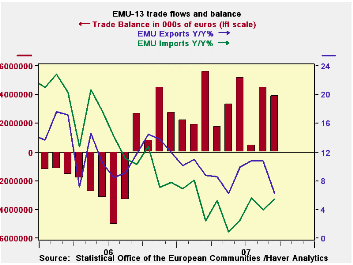 Global| Nov 16 2007
Global| Nov 16 2007The EMU Trade Surplus Shrinks
Summary
Exports slow as imports rise. It is too soon to chalk up the dwindling trade surplus of Europe to the high Euro, but this month’s report is another hint. The surplus is sketching out a shrinking pattern beyond the simple drop of this [...]

Exports slow as imports rise.
It is too soon to chalk up the dwindling trade surplus of
Europe to the high Euro, but this month’s report is another hint. The
surplus is sketching out a shrinking pattern beyond the simple drop of
this month's balance. And exports and imports are starting to assume
the position of trade flows in transition. Exports have shed their bump
up in the growth rate that may just have been a J-curve effect of the
euro’s rise. Imports are rising more rapidly and that could shift if
the strong euro weakens European growth. Still, the strong euro makes
imports cheaper and that would account for some import rise in the
aftermath of shoot up in the currency’s value even as import prices
fell in domestic currency terms (euro terms).
| Euro area 13-Trade Trends for Goods | |||||
|---|---|---|---|---|---|
| m/m% | % SAAR | ||||
| Sep-07 | Aug-07 | 3-Mo | 6-Mo | 12-Mo | |
| Balance* | €€ 3,905 | €€ 4,511 | €€ 2,957 | €€ 3,195 | €€ 3,080 |
| Exports | |||||
| All Exports | -0.4% | 3.5% | 7.3% | 8.3% | 6.3% |
| Food and Drinks | -2.0% | 2.4% | 11.7% | 8.5% | 9.5% |
| Raw Materials | 3.0% | -1.6% | -0.2% | 9.5% | 4.5% |
| Manufacturing | -2.3% | 3.0% | 0.8% | 4.0% | 4.0% |
| Imports | |||||
| All Imports | 0.1% | 0.2% | 12.2% | 11.7% | 5.4% |
| Food and Drinks | 5.1% | 0.7% | 31.3% | 22.4% | 14.2% |
| Raw Materials | -6.8% | 0.8% | -14.8% | -2.9% | 0.4% |
| Manufacturing | -2.7% | 1.1% | 0.8% | 2.7% | 4.0% |
| *Million Euros; mo or period average | |||||
Robert Brusca
AuthorMore in Author Profile »Robert A. Brusca is Chief Economist of Fact and Opinion Economics, a consulting firm he founded in Manhattan. He has been an economist on Wall Street for over 25 years. He has visited central banking and large institutional clients in over 30 countries in his career as an economist. Mr. Brusca was a Divisional Research Chief at the Federal Reserve Bank of NY (Chief of the International Financial markets Division), a Fed Watcher at Irving Trust and Chief Economist at Nikko Securities International. He is widely quoted and appears in various media. Mr. Brusca holds an MA and Ph.D. in economics from Michigan State University and a BA in Economics from the University of Michigan. His research pursues his strong interests in non aligned policy economics as well as international economics. FAO Economics’ research targets investors to assist them in making better investment decisions in stocks, bonds and in a variety of international assets. The company does not manage money and has no conflicts in giving economic advice.
More Economy in Brief
 Global| Feb 05 2026
Global| Feb 05 2026Charts of the Week: Balanced Policy, Resilient Data and AI Narratives
by:Andrew Cates






